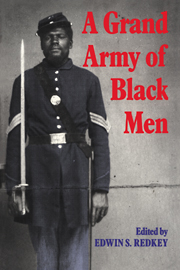Book contents
- Frontmatter
- Contents
- Preface
- Acknowledgments
- List of Abbreviations
- Introduction: For Freedom and Equality
- 1 Black Soldiers in White Regiments
- 2 South Carolina, Georgia, and Florida
- 3 Virginia and North Carolina
- 4 The Gulf States
- 5 Occupation Duty
- 6 For the Rights of Citizens
- 7 The Struggle for Equal Pay
- 8 Racism in the Army
- 9 The Navy
- 10 War's End
- Index
- Cambridge Cultural Social Studies
6 - For the Rights of Citizens
Published online by Cambridge University Press: 24 March 2010
- Frontmatter
- Contents
- Preface
- Acknowledgments
- List of Abbreviations
- Introduction: For Freedom and Equality
- 1 Black Soldiers in White Regiments
- 2 South Carolina, Georgia, and Florida
- 3 Virginia and North Carolina
- 4 The Gulf States
- 5 Occupation Duty
- 6 For the Rights of Citizens
- 7 The Struggle for Equal Pay
- 8 Racism in the Army
- 9 The Navy
- 10 War's End
- Index
- Cambridge Cultural Social Studies
Summary
JAMES HENRY HALL enlisted in the 54th Massachusetts Infantry at his first opportunity. When a recruiter came to his city in February 1863, he left his job as a barber in Philadelphia, even though he was thirty-eight years old, almost too old to be a soldier. With his regiment he fought at James Island, at Fort Wagner, and at Olustee; and he went without pay to protest the army's racism. By August 1864 he told newspaper readers why he was fighting: “If we fight to maintain a Republican Government, we want Republican privileges.” He added, “We do not covet your wives nor your daughters, nor the position of political orator. All we ask is the proper enjoyment of the rights of citizenship, and a free title and acknowledged share in our own noble birthplace.” Whatever else Hall and his fellow soldiers might be fighting for, they were fighting for their rights as Americans.
When the African-American soldiers of the Union Army thought about why they were fighting, American citizenship came first. Some wrote about their desire to free the slaves, and probably all of them wanted to see their brothers and sisters free from bondage. Many of them had been slaves themselves, and more had slave relatives; they knew from experience the pains of slavery. Those who had lived in the Northern states also wanted slavery abolished because it reinforced racism; whites could justify discrimination against free blacks by pointing out that slavery had made them inferior. But most soldiers' letters do not focus on emancipation.
- Type
- Chapter
- Information
- A Grand Army of Black MenLetters from African-American Soldiers in the Union Army 1861–1865, pp. 205 - 228Publisher: Cambridge University PressPrint publication year: 1992

